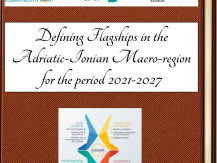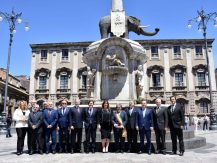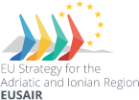The Hellenic Republic assumes the Presidency of the EU Strategy for the Adriatic and Ionian Region (EUSAIR) (1 June 2024 – 31 May 2025)


PRIORITIES OF THE HELLENIC PRESIDENCY OF THE EUROPEAN STRATEGY FOR THE ADRIATIC -IONIAN REGION (EUSAIR) & THE ADRIATIC IONIAN INITIATIVE (AII)
(1 June 2024 – 31 May 2025)
Introduction
The Hellenic Republic assumed for the second time the Presidency of the EU Strategy for the Adriatic and Ionian Region (EUSAIR) and for the fourth time the Presidency of the Adriatic Ionian Initiative (AII) on June 1, 2024.
The Hellenic Presidency of the EUSAIR is launched in the midst of geopolitical challenges in the wider region. During the Hellenic Presidency, the renewal of the mandate of the European Institutions, the adoption of the new EU Strategic Compass and the preparation for Europe after 2027 will take place. In this context, the Presidency considers to take advantage of recent positive developments for the Adriatic-Ionian Macro-region, such as the progress in the course of European integration of the Western Balkans and the strengthening of the relevant funding from the EU, through the New Growth Plan for the Western Balkans.
The Hellenic Presidency will continue the work of the previous Presidencies, responding to the existing and emerging global, European and regional trends affecting the Adriatic-Ionian Macro-region and adapting the Strategy and the Initiative accordingly, where necessary. The participation in the Strategy of four EU member states (Greece, Italy, Croatia, Slovenia) which share common views on a significant number of EU policies, underlining Enlargement and Cohesion Policy, as well as it cooperates with them in informal EU member groups, including MED-9, "Friends of Enlargement" and "Friends of Cohesion", has been taken into account when drafting the Presidency’s priorities. Likewise, the Hellenic Presidency looks forward equally to the cooperation of the other members of the Strategy, Candidate countries of the Western Balkans, as well as San Marino.
In this context, the Hellenic Presidency will seek a new approach for the implementation of the Strategy in order to respond to the revised Action Plan, but also to build on good practices and successful existing methods. This includes the expansion of the scope of participants in the preparation of Thematic Steering Groups (TSGs). To this end, the Presidency expects that the Strategy will benefit from the new Governance Architecture. In this vein, Greece intends to host one meeting of each Pillar in its territory and suggests that the coordinators of the TSGs include in their agendas at least one of the issues foreseen in the revised Action Plan (see below for the indicative calendar of planned activities of the Strategy and the Initiative).
Bearing in mind the above and taking into account that economic development and job creation are among the main objectives of the Strategy, the Hellenic Presidency sets five interrelated issues as priorities:
1. EU enlargement and in particular the support to the accession process of the Western Balkans.
2. Cohesion Policy in the post 2027 period interlinked to the EUSAIR Strategy and highlighting the spatial dimension of the Strategy.
3. Green transition and the effects of climate change.
4. Blue Economy and the development of the appropriate professional skills, education and specialization in blue professions.
5. Environmental protection and promotion of environmental quality.
Schematically, these priorities can be visualized as the vertices of a pentagon, within which actions relevant to the priorities fit and interact.
AII HELLENIC PRESIDENCY 2024-2025
The Greek Chairmanship of the Initiative aims to build on the good practices of the Croatian Chairmanship; In this respect, special emphasis is attributed on the protection of natural and cultural landscape, youth as the ultimate driver for sustainable development and the enhancement of connectivity as a valuable tool in bringing people closer. More specifically, the thematic priorities of the Hellenic Presidency are as follows:
A. Sustainability of Landscape, Historical Monuments & Life along the Coastline and the Hinterland
B. Youth as Pillar of the Present and Driver for the Future
C. Mitigating Marine Pollution & Protecting Natural Environment
D. Promotion of Connectivity as a Vital EU Enlargement Tool
Read the detailed description of the presidency programme in the following document PRIORITIES OF THE HELLENIC PRESIDENCY OF THE EUROPEAN STRATEGY FOR THE ADRIATIC -IONIAN REGION (EUSAIR) & THE ADRIATIC IONIAN INITIATIVE (AII).
For more information on the indicative Timetable of the Hellenic Presidency to EUSAIR, please follow the link: TIMETABLE OF HELLENIC PRESIDENCY EUSAIR-AII*
*Timetable is subject to change
You might be interested in

EUSAIR flagships all summed up!

3rd EUSAIR Annual Forum – CATANIA DECLARATION

The Hellenic Republic assumes the Presidency of the EU Strategy for the Adriatic and Ionian Region (EUSAIR) (1 June 2024 – 31 May 2025)








